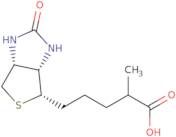Biotin Impurity D - mixture of diastereomers
CAS: 415725-35-8
Rif. 3D-FB45901
| 1mg | Fuori produzione | ||
| 2mg | Fuori produzione | ||
| 5mg | Fuori produzione | ||
| 10mg | Fuori produzione | ||
| 500µg | Fuori produzione |
Informazioni sul prodotto
- (3aS,4S,6aR)-Hexahydro-?-methyl-2-oxo-1H-thieno[3,4-d]imidazole-4-pentanoic acid
Biotin is a water-soluble vitamin that is involved in the metabolism of fat and amino acids. It is also important for the synthesis of fatty acids and cholesterol, as well as for energy production. Biotin is essential to human health. The uptake system for biotin was discovered in bacteria by hybridizing biotin with carrier DNA and injecting it into mice. This uptake system has been found to be present in animals and humans. The uptake mechanism appears to involve binding of biotin to a specific receptor on the cell surface followed by endocytosis and release into the cytoplasm where it binds with an enzyme called carboxylase, which converts biotin into coenzyme A (CoA). The CoA then enters metabolic pathways that generate ATP. Biotin is absorbed from food sources such as raw eggs, liver, peanuts, soybeans, yeast or nutritional supplements containing biotin or other vitamins. Biotin is readily available commercially as a supplement in the





